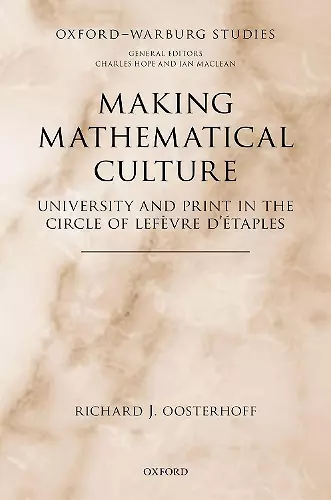Making Mathematical Culture
University and Print in the Circle of Lefèvre d'Étaples
Format:Hardback
Publisher:Oxford University Press
Published:14th Aug '18
Currently unavailable, and unfortunately no date known when it will be back

In 1503, for the first time, a student in Paris was able to spend his entire university career studying only the printed textbooks of his teacher, thanks to the works of the humanist and university reformer Jacques Lefèvre d'Étaples (c. 1455-1536). As printed books became central to the intellectual habits of following generations, Lefèvre turned especially to mathematics as a way to renovate the medieval university. Making Mathematical Culture argues this was a pivatol moment in the cultural history of Europe and explores how the rise of the printed book contributed to the growing profile of mathematics in the region. Using student manuscripts and annotated books, Making Mathematical Culture offers a new account of printed textbooks, as jointly made by masters and students, and how such collaborative practices informed approaches to mathematics.
Oosterhoff's book is a first-rate scholarly work. Through his sharp and intelligent scrutiny of the dense (and prolific) printed Latin oeuvres generated by Lefèvre and other members of the Fabrist circle, the author reveals a fascinating and transformative late fifteenth- and early sixteenth-century pedagogical era in which mathematics was not only considered for its practical purposes but also contemplated for "regulating the soul as it realizes its larger goals of knowledge" (49). This book is certainly as important to Renaissance Paris as Andrew Warwick's Masters of Theory (2003) is to Victorian Cambridge. I highly recommend the book to early modern intellectual scholars who desire a broader understanding of French humanism and to historians of science seeking earlier origins of the mathematical way in natural philosophy. * Jean-François Gauvin, Université Laval, Renaissance Quarterly *
Oosterhoff has given us an exciting, creative, and well-documented work. It considerably advances our understanding of the cognitive history of the book and of the central role of mathematics in the early modern university, and it should become a mainstay of examination lists and bibliographies. * Abram Kaplan, Junior Fellow at the Society of Fellows at Harvard University, Isis Journal of the History of Science Society *
ISBN: 9780198823520
Dimensions: 238mm x 163mm x 23mm
Weight: 616g
292 pages